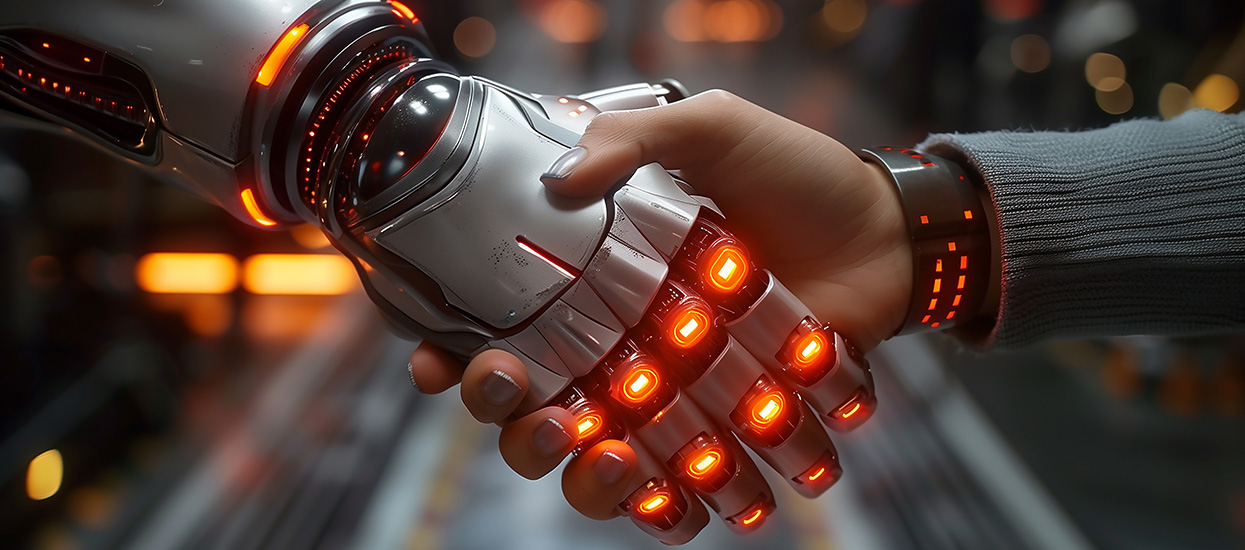- What we offer
- Who we serve
- Digital Transformation
- Our Approach
- Careers
- About Us
- Contact Us

The role of human resources (HR) has evolved beyond personnel and administrative tasks. Data, analytics, AI and automation in HR are transforming the way organizations manage people.
According to a report by the Society for Human Resource Management (SHRM), 1 in 4 organizations are already using artificial intelligence and HR automation tools to support activities including recruitment and hiring.
This digital shift is not only about improving efficiency and streamlining operations through technology. It is about HR being a strategic partner to the organization by focusing on its cultural landscape.
In this article, we delve into the key ways in which these technologies are aiding businesses to reform their HR practices and gear up for the future of work.
In 2023, almost 4 in 5 employers reported difficulty in finding the skilled talent they required. This was more than double the difficulty in 2015. Considering how critical hiring is to organizations, the need is greater than ever to utilize AI and HR automation software to streamline the recruitment process.
With AI and automation in HR recruitment processes, companies are able to:
For example, Johnson & Johnson (J&J) utilized an augmented writing platform, Textio, to improve their job descriptions. The tool provided insights that might have otherwise gone unnoticed. For instance, J&J found that when the term “stakeholder” was used, the job posts would not perform as well.
However, it is not just about discovering the right talent. More automation and AI leads to less time spent on simple, repetitive tasks, which frees up time to focus on strategic initiatives such as employee engagement and satisfaction.
From personalized development plans to objective, data-driven assessments and opportunities for continuous learning, employee performance management has been revolutionized with the use of AI-powered tools.
HR professionals are equipped with capabilities such as real-time feedback, coaching suggestions, and actionable insights to make informed decisions and support employees in unlocking their full potential.
As an example, Panasonic used the people insight platform Visier to gain accurate insights to drive better business outcomes. The results included reducing two-week projects to 30-minute chats and increasing a hybrid model’s productivity.
Companies can standardize and simplify the otherwise complex and stressful onboarding process with automation. This can help manage tasks such as digital document management, checklist generation, and onboarding scheduling.
For example, Roadsurfer, a campervan company, used Zavvy, an AI-enhanced talent management platform, to optimize its onboarding processes and welcome new hires across 36 locations. New joiners were assigned a company-wide journey guiding them through the company values, teams, compliance guidelines, IT setup and more. Interactive quizzes and other exercises were used to help retain the knowledge.
AI is further being used to personalize how talent engages with the workplace by providing employees with tailored information and recommendations, such as relevant training or new openings and development opportunities in the company.
With instant feedback mechanisms, employees further gain insights to improve their performance and identify areas for further development. The result is a work environment that is both supportive and engaging.
Manually implementing benefits administration can lead to inefficiencies and errors that negatively impact the employee experience as well as HR operations.
Automation helps to simplify the process by managing various elements of benefits administration, such as tracking individual employee benefits, making adjustments due to changes, or facilitating open enrolment.
Since automation and AI technologies can gather and analyze vast amounts of data, HR departments are empowered with valuable insights to make informed decisions.
Furthermore, predictive analytics can help identify trends related to employee performance, attrition rates, and training needs. This allows HR professionals to develop targeted strategies for talent development and succession planning.
AI and machine learning can be used to personalize wellness programs, detect health risks early, provide mental health support, empower employees to make better health decisions, and more.
Organizations worldwide are using AI to create personalized and adaptive learning experiences for their workforce.
For example, IBM used the AI assistant to transform learning event management. The result was a 91% improvement in turnaround time for bringing attendance rosters up to speed, and a 15% Net Promoter Score (NPS) year-on-year point increase.
Data-driven insights can identify training needs, evaluate responsiveness, improve decision-making, and help L&D teams improve the overall effectiveness of their efforts. These resources are also helpful to increase the scale of training programs more quickly and at lower costs.
As AI technologies continue to develop, they will become increasingly integrated into HR practices. Think virtual Reality (VR)-aided onboarding processes and employee support chatbots. Such experiences are only going to evolve and get better with time.
However, it is important to remember that automation and AI are not silver bullets. There are challenges associated with using artificial intelligence and automation in HR. As you embrace these technologies in your HR practice, here are some relevant points to keep in mind:
Addressing these challenges will ultimately require a comprehensive approach that combines ethical considerations, continuous monitoring, employee engagement, and a focus on maintaining a balance between the benefits of AI and the human touch in HR practices.
For HR workflow, the future is now. Harnessing the power of AI and automation in HR helps streamline operational efficiency and create a more engaged and satisfied workforce.
HR as solely an administrative function is no longer competitive in today’s world; instead, it must strive to operate as a strategic partner that drives positive business outcomes.
Silverskills is a digital transformation company that can help your HR department achieve this goal. Are you ready to unlock the full potential of AI and automation in HR? Talk to our team now to learn more about how we can help transform your HR processes for the new era of work.
Please fill the details below. A representative will contact you shortly after receiving your request.